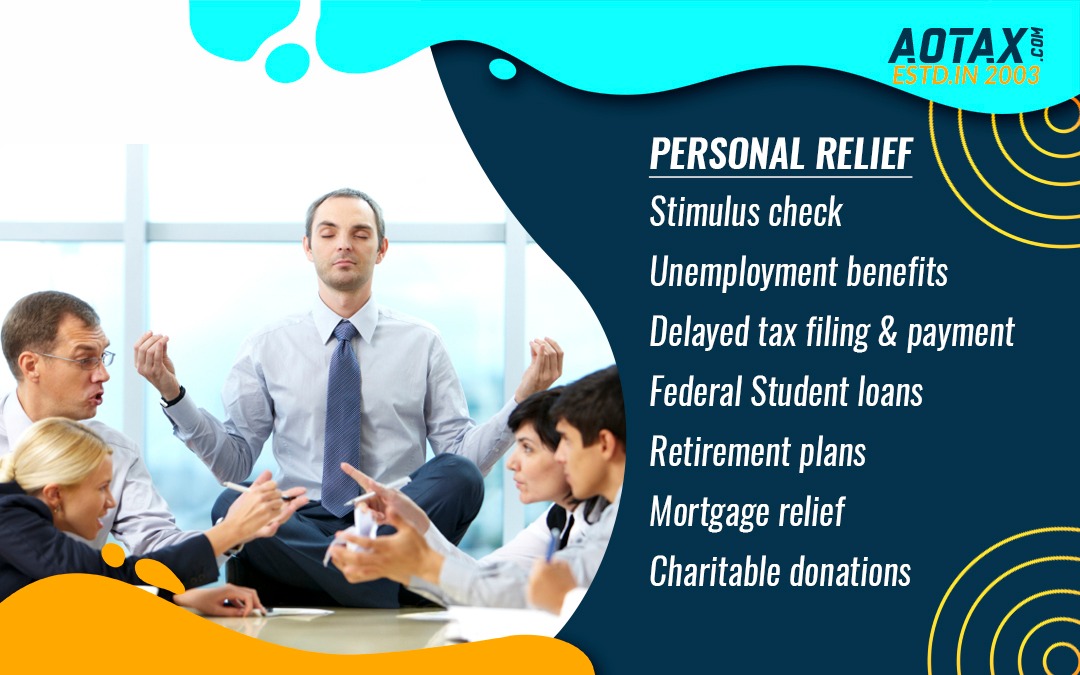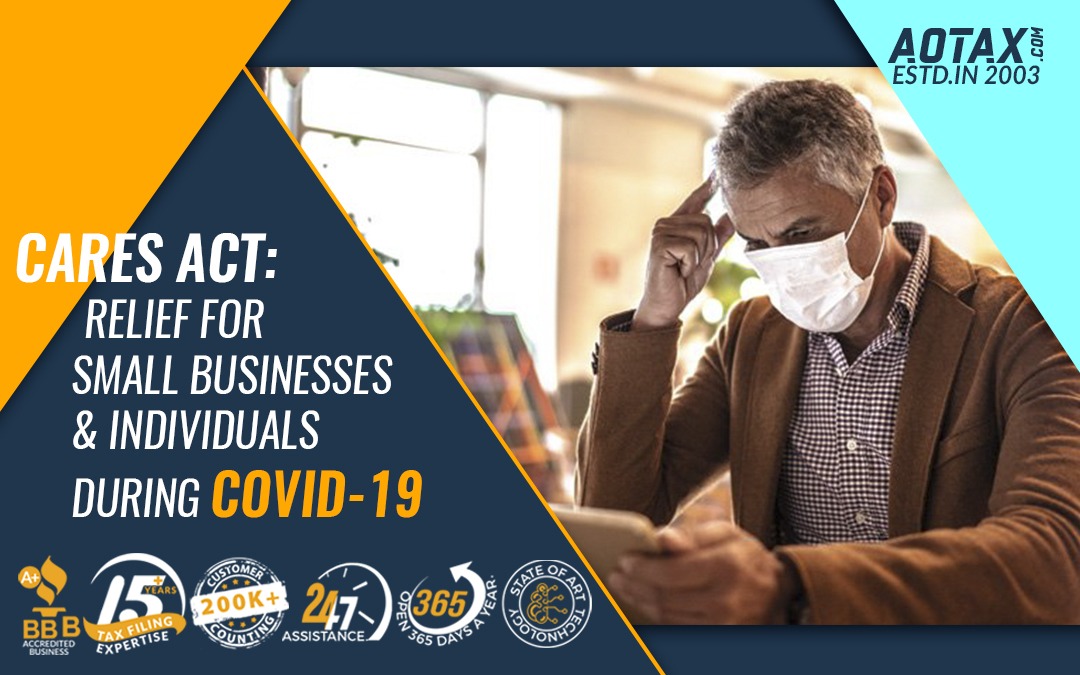CARES Act: Relief for small businesses and individuals during COVID-19
The outbreak of the pandemic COVID-19 has created a threatening impact on the lives and livelihoods of people across the world. In the US, more than 2 lakhs people have been affected by this dreadful disease and there have been around 6K deaths due to this pandemic. COVID-19 has not only affected the lives of common people but also the economy of the nation. There has been a remarkable slowdown in businesses with the common masses being laid off from their jobs.CARES Act: Relief for small businesses and individuals during COVID-19
In such adverse situations, the Federal Government has brought certain changes in the tax rules. There has been the implementation of some new laws for reducing the stress that the common people are facing.
Coronavirus Aid, Relief, and Economic Security (CARES) Act

On 27th March 2020, the CARES Act was passed in the House of Representatives by a voice vote. Then the bill was signed into law by the US President. It is the third round of support from the Federal Government for the general public concerning the outbreak of the COVID-19. In the previous weeks, the Federal Government had already passed the Families First Coronavirus Act (FFCRA) and sanctioned an amount of $8.3 billion for the public health initiatives.
Business Relief

SBA Economic Injury Disaster Loans (EIDL) and Emergency Grants – The SBA stands for Small Business Administration which is a federal program that helps small businesses with financial assistance. Loans and EIDL are offered by SBA when there is a critical situation. A business must have been operational on 31st January 2020 for being eligible for the loans by SBA. According to the provisions of the CARES Act, the SBA would provide an advance of up to $10,000 to small businesses that have been harmed in COVID-19. This loan would be provided within 3 days of applying. There is no provision for the return of the advance by the businesses and can be used for paying debts, keeping employees on the payroll, paying sick leave, rent or other obligations.
PPP Forgivable Loan – For a small business to avail of the PPP forgivable loan, it must have been in business on 15th February 2020. Small businesses, sole proprietorships with a workforce of 500 employees or less, self-employed individuals and even independent contractors can apply for this loan. The amount of this loan can be up to 2.5 times the business’s average monthly payroll costs plus an extra 25%. It is necessary that at least 75% of the loan amount must be utilized for payroll costs and the remaining 25% can be used for business rent, debts, and other expenses.
Local Government Grants – Small business grants are being offered by some Local Governments for relief to businesses.
Paid Leave credits – Small and midsize businesses would provide paid leaves to their employees who are sick due to COVID-19 or need to stay back at home for taking of a family member who has been affected by COVID-19. The employers would be provided with tax credits for the paid leaves that are being provided to their employees.
Payroll tax credits – If a business has been impacted by the economic shutdown which took place from mid-March 2020 to December 2020, then the exact payroll tax need not be paid and if the organization/business has already made the payment then they will get back the money. This is known as retention credit.
Also, employers can delay payment of that part of the employee payroll tax which is related to social security. This can be paid over the upcoming two years i.e. by the end of 2021 and 2022.
Other provisions – Some other provisions are also associated with the business relief such as relaxation of the limit to the carrying back of net operating losses up to 5 years, avail of additional business expenses under the CARES Act, etc.
Activities to be done
To avail the business reliefs under the CARES Act, small businesses must ensure that their accounting records are well-maintained. The Profit and Loss Statement must be updated as it would highlight the income, payroll and other expenses. Proper estimation must be done which would assess the financial ability of the business to survive the economic shutdown, money that must be needed by the business and the loan re-payment.
Personal Relief

Stimulus check – The Federal Government would provide the taxpayers with a direct deposit of up to $1200 in case of a single person, $2400 for married couples and an additional $500 for each child. This stimulus checks would be available only for those individuals who have an income of up to $75000 and $150,000 for married couples.
Unemployment benefits – Those taxpayers who are already receiving unemployment benefits would receive an additional $600 every week until 31st July 2020. There has been an extension of 13 weeks for receipt of unemployment benefits than the period allowed by State unemployment programs. Employees would be beneficial by Short-time compensation and work-share programs where their working hours would be reduced rather than being laid off.
Delayed tax filing and payment – The IRS have postponed the tax filing and payment date to 15th July 2020 rather than 15th April 2020. Also, for self-employed taxpayers, the date for the estimated tax payment has been moved to 15th July 2020.
Federal Student loans – The interest on the Student loan which is due on the US Department of Education has been waived temporarily.
Retirement plans – Early retirement distribution done in 2020 up to an amount of $100,000 are not subject to any penalty if the taxpayer or his family are diagnosed with COVID-19 or have been impacted financially due to COVID-19.
Mortgage relief – The Federal Government has also announced suspensions in mortgage payments during the economic shutdown of COVID-19.
Charitable donations – Taxpayers can deduct up to $300 in the cash contributions that have been made for qualified charitable donations. For 2020, individuals can deduct more than 50% of their AGI (Adjusted Gross Income) for charitable organizations.
Activities to be done
The individual taxpayers should ensure that if their banking information or current address is not present with the IRS and if not then the post office must have the address. Also, if an individual has not filed his tax returns for 2019 then he must consult with his tax professional about the feasibility and impacts of filing the tax returns now.
Conclusion
Hence, these new provisions implemented according to the CARES Act prove that it is quite a positive step to help individuals and businesses to overcome the hardships or the economic ruins which have been caused by the COVID-19.
References
https://www.simpleprofit.com/coronavirus
https://www.forbes.com/sites/leonlabrecque/2020/03/29/the-cares-act-has-passed-here-are-the-highlights/#3e3a5cc168cd
https://taxfoundation.org/cares-act-senate-coronavirus-bill-economic-relief-plan/


Recent Comments